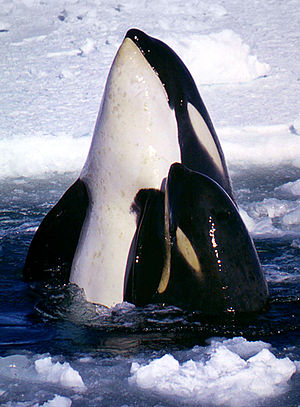Orca (Orcinus orca)

Orcas, also known as killer whales, are among the world’s most easily recognised marine mammals. They are the largest member of the dolphin family and are highly intelligent and social animals[1]. Orcas can be found in all of the world's oceans in a variety of marine environments, from Arctic and Antarctic regions to tropical seas. They have a diverse diet, although individual populations often specialize in particular types of prey. Some feed exclusively on fish, while others hunt marine mammals such as seals and other species of dolphin.
Orcas are apex predators, as they have no natural predators. They are highly social; some populations are composed of very stable matrilineal family groups (pods) which are the most stable of any animal species. Their sophisticated hunting techniques and vocal behaviors, which are often specific to a particular group and passed across generations, have been described as manifestations of animal culture[1].
Orcas are apex predators, as they have no natural predators. They are highly social; some populations are composed of very stable matrilineal family groups (pods) which are the most stable of any animal species. Their sophisticated hunting techniques and vocal behaviors, which are often specific to a particular group and passed across generations, have been described as manifestations of animal culture.
Social behaviour
Orcas are highly social animals that live in groups or pods where they hunt together and share responsibility for raising young and taking care of the sick or injured.[2] They have evolved a complex culture: a suite of behaviors animals learn from one another. They communicate with distinctive calls and whistles and can live 60 years or more. They stay in tight-knit matrilineal groups led by older females that model specific behaviors to younger animals[3].
Orcas have demonstrated captivating social habits, such as living in highly distinctive lifelong pods, as well as exceptional memory and communication skills (amongst other qualities), which have enabled them to acquire immense popularity amongst cetacean admirers[2]. Based on observations both in captivity and in the wild, orcas seem to exhibit a wide range of emotions, including frustration, anger, fear, joy and even self–awareness, which makes them enthralling to observe as social mammals[2].
See also
References
- ↑ 1.0 1.1 https://en.wikipedia.org/wiki/Orca Wikipedia
- ↑ 2.0 2.1 2.2 Orcas are social mammals MedCrave online
- ↑ Understanding Orca Culture Smithsonian Magazine
